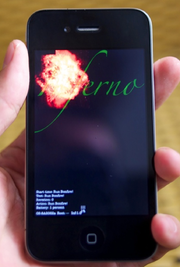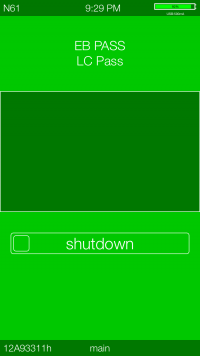|
The iPhone Wiki is no longer updated. Visit this article on The Apple Wiki for current information. |
Difference between revisions of "Inferno (utility)"
m |
|||
| (18 intermediate revisions by 7 users not shown) | |||
| Line 1: | Line 1: | ||
| + | {{internal software|firmware}} |
||
| − | [[File:Inferno.png|thumb|right|180px|Inferno running on a prototype [[n90ap|iPhone 4 (GSM)]]]] |
||
| + | [[File:Inferno.png|thumb|right|180px|Inferno running on a prototype [[Inferno_8A2062a|iPhone 4 (iPhone3,1) 8A2062a]]]] |
||
| − | '''Inferno''' is a [[Apple Internal Apps|diagnostic utility]] used in Apple internal firmwares. Its functionality is similiar, if not the same, to the [[BurnIn]] utility. It runs a set of hardware and software checks predefined by [[PList File Format|PList]] files. It can shut itself down if device reaches critical temperature level. |
||
| + | [[File:Inferno iPhone 6.png|thumb|right|200px|[[Inferno 12A93311h]] running on an iPhone 6 prototype]] |
||
| + | '''Inferno''' is a [[Apple Internal Apps|diagnostic utility]] commonly used in many internal NonUI firmwares. It runs a set of hardware and software checks predefined by [[PList File Format|PList]] files. It does not feature any on-screen buttons or ways of interacting with it, displaying only the word "Inferno" on a flame-type background. Sometimes debug backgrounds are also used, which are different from the standard one. At the bottom of the screen there is information about the device and operating system it's running. |
||
| − | == See also == |
||
| + | |||
| + | Inferno is usually launched via the BurnIn application in later versions of 4.0 and beyond. It can also be launched via PC if the device is connected via USB SSH. The executable is located in /usr/local/bin, alongside various other CLI internal tools. If launched like this it will display vast amounts of information. |
||
| + | |||
| + | It can shut itself down if device reaches critical temperature level. It can also be accessed in any firmware by passing the boot argument "inferno" to the device. Because development iBoots pass boot arguments to the kernel (unlike production variants), this can be done on any prototype device. |
||
| + | |||
| + | |||
| + | The following are pictures and documentation of prototype devices running known Inferno builds. |
||
| + | |||
| + | == Known versions == |
||
| + | * [[Inferno 7C144]] |
||
| + | * [[Inferno 7C1023e]] |
||
* [[Inferno 8A2062a]] |
* [[Inferno 8A2062a]] |
||
| + | * [[Inferno 10A23110z]] |
||
| + | * [[Inferno 11B64940j]] |
||
| + | * [[Inferno 12A93311h]] |
||
| − | {{stub| |
+ | {{stub|software}} |
[[Category:Apple Internal Apps]] |
[[Category:Apple Internal Apps]] |
||
Latest revision as of 17:04, 11 May 2021
This article discusses software internally used by Apple. Acquiring a copy without Apple's consent is illegal and may result in being scammed. |


Inferno is a diagnostic utility commonly used in many internal NonUI firmwares. It runs a set of hardware and software checks predefined by PList files. It does not feature any on-screen buttons or ways of interacting with it, displaying only the word "Inferno" on a flame-type background. Sometimes debug backgrounds are also used, which are different from the standard one. At the bottom of the screen there is information about the device and operating system it's running.
Inferno is usually launched via the BurnIn application in later versions of 4.0 and beyond. It can also be launched via PC if the device is connected via USB SSH. The executable is located in /usr/local/bin, alongside various other CLI internal tools. If launched like this it will display vast amounts of information.
It can shut itself down if device reaches critical temperature level. It can also be accessed in any firmware by passing the boot argument "inferno" to the device. Because development iBoots pass boot arguments to the kernel (unlike production variants), this can be done on any prototype device.
The following are pictures and documentation of prototype devices running known Inferno builds.
Known versions
| This software article is a "stub", an incomplete page. Please add more content to this article and remove this tag. |